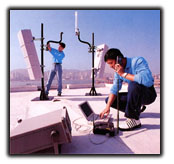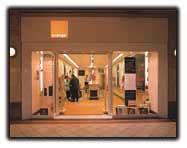
Telecommunications

The Group's telecommunications division provides a range of wirefree, quality products and services to its customers in Hong Kong, Asia-Pacific and Europe. In Hong Kong, the Group operates mobile, fixed-line and paging networks, while in the UK, the Orange Personal Communications Services network covers 92% of the UK population.
Profit from the Group's telecommunications division totalled HK$3,642 million (1995 - HK$324 million). This result reflects the profit derived from the flotation of Orange plc.

Hong Kong Operations
Although profitability was down as a result of operating duplicate networks, 1996 was an important year for the Group's telecommunications businesses in Hong Kong. The two limited capacity analogue systems have now been almost entirely changed over to two digital systems with much greater subscriber capacity. In addition, the Group continued to build on strong foundations by concentrating on expanding its customer base, consolidating resources and enhancing service standards.
During the year, Hutchison Telecommunications (Hong Kong) Limited was established to manage all of the Group's telecom activities in Hong Kong. As a result of the reorganisation, significant benefits were achieved through the streamlining of marketing and the consolidation of operational resources of its cellular telephone, paging and fixed-line network services. The number of subscribers on the Group's cellular networks has trebled, with approximately 275,000 subscribers currently on the GSM network and over 65,000 customers on the CDMA / AMPS networks.
In the face of increased competition in the telecommunications sector, greater emphasis is being placed on the enhancement of network service quality. As part of this exercise, the Group has increased the number of cell sites throughout Hong Kong to more than 500. Supporting this initiative is a high-profile marketing and advertising campaign and the launch of several new handsets with innovative tariff packages. At the retail level, the company has an extensive network of 45 outlets and took advantage of synergy within the Group by promoting products and services throughout the Group's Fortress stores. Customer services were further upgraded with the establishment of a third maintenance centre in the New Territories and three dedicated customer services outlets.
To further bolster customer loyalty, the company successfully launched the Everyday Card in July, which provides a range of discounts at leading retail outlets. More than 700,000 cardholders were registered by year-end. Based on the card's strong popularity, the number of merchants participating in the programme continues to expand.
In July, the Group was awarded one of six Personal Communications services licunces. The new licence provides additional spectrum for future growth and will allow the Group to introduce a variety of new products and services which appeal to a wider market. The service operates on the same technological platform as the GSM network. As previously announced, the CT2 and TACS networks, which were overtaken by new technology, were closed during 1996, while the AMPS network is expected to cease operations by the middle of this year.
Growth in the paging business was flat, but the Group maintained its leading 33% of the Hong Kong market by promoting a range of attractively priced service packages. In Macau, the paging business turned in an improved performance, ending the year with about 20,000 subscribers.
Good progress has been made in the infrastructural development of the Network Eight fixed-line service, with all relevant licensing requirements met in full before the year end. When the service was launched in January of this year, the company was able to provide local service to several of the main business districts of Hong Kong. By the end of this year, ATM technology for high-speed data services will also be introduced. The IDD 008 service achieved satisfactory results, ending the year with 230,000 subscribers, the majority of whom were corporate customers.
China Operations
Although the Group's joint venture telecommunications equipment company, Chung Kiu Telecommunications (China) Limited, had a slow year, the development and manufacturing of a new paging unit is expected to increase revenues after it is launched this year. The company increased to five the number of cities in which it provides paging services. sales of trunked radio systems were satisfactory. Chung Kiu is also participating in a joint venture to provide consultancy and engineering services to the Great Wall CDMA cellular networks in several provinces in China.
Asia Pacific Operations
1996 was a year of building and identifying opportunities for the Group's telecommunications business in the Asia Pacific region. Operating in an environment of rising consumer affluence, low teledensity and increasing privatisation of telecommunication monopolies around the region, the Group has been actively exploring potential investment opportunities. At the same time, the Group consolidated and streamlined its existing operations to be more competitive in a rapidly changing industry.
The Group's joint ventures in India, Indonesia, Thailand and Australia performed satisfactorily in their respective markets, and efforts are being concentrated on product diversification and on building up their subscriber bases.
The cellular and paging joint venture operations in India celebrated their first full year of operation as a market leader in cellular services in Mumbai, with more than 50,000 subscribers, and as a dominant player in the seven cities where it provides paging services. The Group has an effective 29.4% interest in the joint venture that operates both of these businesses.
In April, the Group's 42.5% owned joint venture in Indonesia launched its paging operations in Jakarta, Bandung and Surabaya and has reported steady growth.
In Thailand, the joint venture paging operation, in which the Group has a 45% interest, reported a satisfactory result for the year. The Group's paging joint venture operation in Malaysia retained its market share and subscriber base, while in Singapore, preparations are progressing for the launch of the Group's joint venture paging network. The service is expected to roll out in April.

The 56% owned cellular service network in Australia achieved satisfactory results, while paging activities, in line with international trends in mature markets, declined due to the migration of subscribers to cellular telephones.
The wholly owned Corporate Access business, which provides telecommunications services in the Asia Pacific region using very small aperture terminals (VSAT), consolidated its operations by entering into strategic partnerships with independent distributors in its key markets.
Metro Broadcast
Metro Broadcast corporation, with its three lively radio stations, ended the year with encouraging gains in revenues as a result of wider support from advertisers and listeners alike. The Group has a 50% interest in this operation.
Asia Satellite Telecommunications Holdings
In June,AsiaSat was listed on the New York and Hong Kong stock exchanges by way of a global share offering, which was oversubscribed. The construction of the company's third communications satellite, AsiaSat 3, is progressing satisfactorily, and it is currently scheduled tobe launched towards the end of this year. In January of this year, the Group exercised its option and sold part of its shareholding in AsiaSat to China International Trust and Investment Corp ("CITIC"). As a result, the Group's shareholding in AsiaSat has been reduced to 23%, which is the same as that currently held by both CITIC and Cable & Wireless plc. The Group made an exceptional gain of HK$717 million from this transaction.

Europe Operations
In April, the sale of a minority stake of approximately 30% in Orange plc, by way of a global offering of shares, was successfully completed, Orange shares are now listed on the London Stock Exchange and on NASDAQ in the United States. The Group's effective interest was reduced to 48.22%, but this was recently increased to 49.02% following the purchase of 9.5 million shares of Orange from British Aerospace.
Orange continued its rapid growth, with the subscriber base more than troubling from 379,000 at the end of 1995 to approximately 888,000 at the present time. During 1996, Orange accounted for approximately 29% of the growth in the UK cellular telephone market and now has an 11% share of the market as a whole.
As part of its on-going network expansiun programme, more than 650 operational base stations were added to the network in 1996, increasing the total to more than 2,600. As a result, the Orange network now covers over 92% of the UK population. The paging and cellular service provision businesses in the UK performed satisfactorily. The cellular service provision businesses in France and Germany achieved good growth, with subscriber bases at year-end of 189,000 and 137,000 respectively.
Copyright 2001 © Hutchison
Whampoa Limited. All rights reserved.